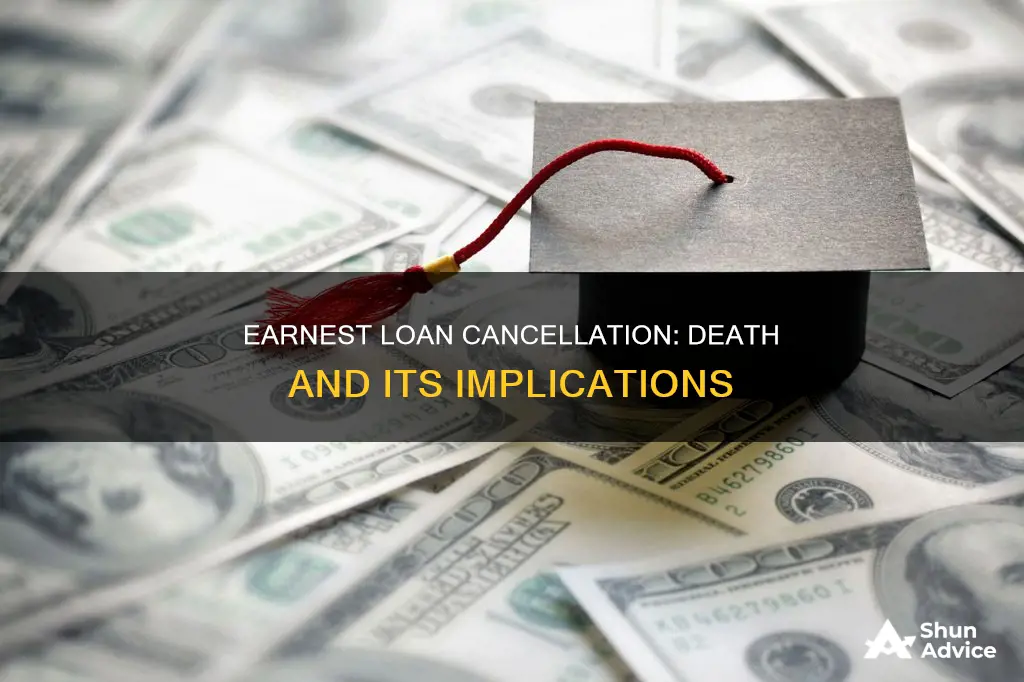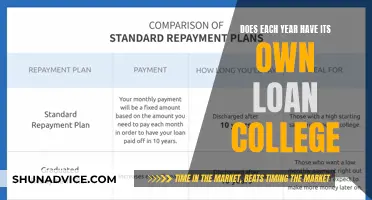
Earnest is an online lender that offers student loan refinancing and private student loans, as well as personal loans. Its refinancing loan is best for borrowers who want to customize their repayment schedule to pay off debt fast. Its private student loan is an option for borrowers who want flexible repayment. Earnest loans offer death or disability discharge, meaning that in the event of the borrower's death, the loan will be fully discharged.
| Characteristics | Values |
|---|---|
| Federal student loans | Discharged when the borrower dies |
| Private student loans | May vary depending on the lender and whether there is a cosigner on the loan |
| Earnest student loans | Discharged in the event of the borrower's death or total and permanent disability |
| Earnest student loan refinancing | Offers flexible repayment options, interest-only payments, and the ability to skip one payment every 12 months |
| Private student loan repayment options | Deferred, fixed, or interest-only payments |
What You'll Learn
- Earnest discharges all student loans in the event of the borrower's death
- Federal student loans are discharged upon the borrower's death
- Private student loans may vary depending on the lender
- A surviving spouse may be responsible for repaying portions of the loan
- Death or disability discharge is available for borrowers

Earnest discharges all student loans in the event of the borrower's death
Earnest, an online lender, offers student loan refinancing and private student loans for undergraduate and graduate students. It stands out for its flexible repayment options, including interest-only payments, same-day payments, and the ability to schedule multiple extra payments. In addition, Earnest provides protections for borrowers facing financial hardship, such as forbearance and deferment.
In the unfortunate event of the borrower's death or total and permanent disability, Earnest will discharge all student loans. This means that the loan will be forgiven, and the borrower's loved ones will not be burdened by the debt. This policy is outlined in Section H of the Earnest loan agreement, which covers deferment, forbearance, and loan discharge.
It is important to note that the treatment of student loans in the event of a borrower's death can vary depending on the lender and the type of loan. While federal student loans are typically discharged upon the borrower's death, the policy for private loans can differ. Some private lenders may discharge the loans, while others may charge the debt against the borrower's estate. Additionally, the presence of a cosigner on the loan can also impact the loan's status in the event of the borrower's death.
To provide relief for grieving families, the Tax Cuts and Jobs Act of 2017 states that student loans discharged due to death or disability are not to be included as taxable income. This means that families will not face additional tax implications on top of their loss. Overall, Earnest's discharge policy in the event of the borrower's death provides peace of mind and financial protection for borrowers and their loved ones.
Deardens and Loans: What's the Connection?
You may want to see also

Federal student loans are discharged upon the borrower's death
It is important to note that the process of discharging a federal student loan upon the borrower's death may vary depending on the loan servicer. Therefore, it is recommended to contact the loan servicer directly to understand their specific requirements and procedures.
In addition to federal student loans, some private lenders also offer loan discharge in the event of the borrower's death. However, this is not a requirement for private lenders, and policies may vary. It is essential to review the loan agreement and the lender's policy documents to understand how private student loans are handled in the event of the borrower's death.
Earnest, for example, offers discharge due to the death of the primary borrower or student for both federal and private student loans. In such cases, the co-signer is released from the loan and is not expected to repay the debt. However, it is important to note that Earnest is not the only lender that discharges loans in the event of death, and other lenders may have different policies.
To summarize, federal student loans are discharged upon the borrower's death, and the remaining balance is forgiven. Private student loans may also be discharged, depending on the lender's policies. It is important to review the loan agreement and understand the discharge policies to ensure that your loved ones are protected from repaying your student loans in the event of your death.
Deferring Institutional Loans: Impact on PSLF Qualification
You may want to see also

Private student loans may vary depending on the lender
Private student loans are provided by private lenders and banks, and they are specifically designed to cover education-related expenses. The best private student loan for an individual depends on their unique circumstances and priorities. When choosing a private student loan, it is important to compare multiple options and carefully consider the terms and interest rates being offered.
Interest rates are another factor that may vary depending on the lender. Private student loans offer either fixed or variable interest rates. A fixed rate means that the monthly payment will remain the same for the duration of the loan, while a variable interest rate is tied to market conditions, causing the loan payment to fluctuate. It is important to carefully consider your options, as you may not be able to switch your interest rate type without refinancing. When comparing student loans from different lenders, look at the annual percentage rate (APR) rather than just the advertised interest rate.
Eligibility requirements also vary depending on the lender. Most private lenders require a credit score in the mid-600s, and if the student does not meet this requirement, the lender may require a creditworthy co-signer. Higher credit scores translate to lower interest rates, and vice versa. Some lenders may also require a minimum income of $40,000 per year. Other factors that may be considered when determining eligibility include whether the borrower is attending an eligible school, meets enrollment criteria, and meets debt-to-income requirements.
Discover Loan: Sensible Option or Misguided Choice?
You may want to see also

A surviving spouse may be responsible for repaying portions of the loan
The responsibility of repaying a loan typically falls on the borrower. However, in the unfortunate event of the borrower's death, the loan may be discharged, or the responsibility may fall on a cosigner or the borrower's estate.
In the case of Earnest student loans, the company will discharge all private student loans in the event of the borrower's death or total and permanent disability. This means that the borrower's loved ones will not be burdened with the debt. This policy is outlined in Section H of the loan agreement, which covers deferment, forbearance, and loan discharge.
However, it's important to note that the policies for discharging private student loans can vary depending on the lender and the specific loan terms. While some lenders may discharge the loan, others may charge the debt against the borrower's estate. Additionally, the laws and policies regarding loan discharge in the event of death can vary depending on the state and country.
Now, let's focus on the scenario where a surviving spouse may be responsible for repaying portions of the loan. This typically arises when the borrower took out private student loans after marriage and resided in a community property state. In these states, specific laws may hold the surviving spouse responsible for repaying a portion of the remaining private student loan balance, even if they did not originally cosign the loan. This is a unique situation that arises due to the legal framework of community property states, which have specific laws governing marital assets and liabilities.
It's always advisable to carefully review the loan agreement and understand the policies and laws that apply in your specific state or country. The loan agreement should outline the terms and conditions related to death and discharge of loans. By reviewing these documents, borrowers and their loved ones can gain a clear understanding of their rights and responsibilities in the unfortunate event of death.
Construction Loans: Appliances Included or Not?
You may want to see also

Death or disability discharge is available for borrowers
Death or disability discharge is available for Earnest borrowers. In the event of the borrower's death or total and permanent disability, Earnest will discharge all student loans. This is also the case for a co-signer on the loan.
Earnest offers student loan refinancing and private student loans for undergraduate and graduate students. It stands out for its flexible repayment options, including interest-only payments for up to 24 months in three-month increments, and the ability to skip one payment every 12 months. Borrowers can also make same-day payments and schedule multiple extra payments at once.
It's important to note that the policy for discharging private student loans in the event of the borrower's death can vary depending on the lender. While some private lenders will discharge loans if the primary borrower dies, others may charge the debt against the borrower's estate. Federal student loans, on the other hand, are discharged when the borrower dies.
Additionally, if the borrower took out private student loans after getting married and resided in a community property state, the surviving spouse may be held responsible for repaying portions of the remaining private student loan balance after their spouse's death, even if they did not co-sign the loan originally. It's always a good idea to check the loan terms and agreements to understand how death and discharge of loans are handled by the servicer.
Discover Student Loan Grace Period: What You Need to Know
You may want to see also
Frequently asked questions
Earnest will discharge all student loans in the event of the borrower's death. This is also the case for federal student loans. However, the policy for discharging private student loans can vary depending on the lender and whether there is a co-signer on the loan.
If there is a co-signer on the loan, they will be responsible for repayment of the loan over the remainder of the repayment term.
In some cases, Earnest can discharge a loan due to the death of a co-signer. However, this is not always the case and borrowers would need to contact Earnest's Client Happiness team for assistance.
If the borrower resided in a community property state, the surviving spouse may be held responsible for repaying portions of the remaining private student loan balance after their loved one's passing, even if they did not co-sign originally.
Earnest offers flexible repayment options, including interest-only payments for up to 24 months, the ability to skip one payment every 12 months, and forbearance or deferment options that allow you to temporarily pause making payments.







